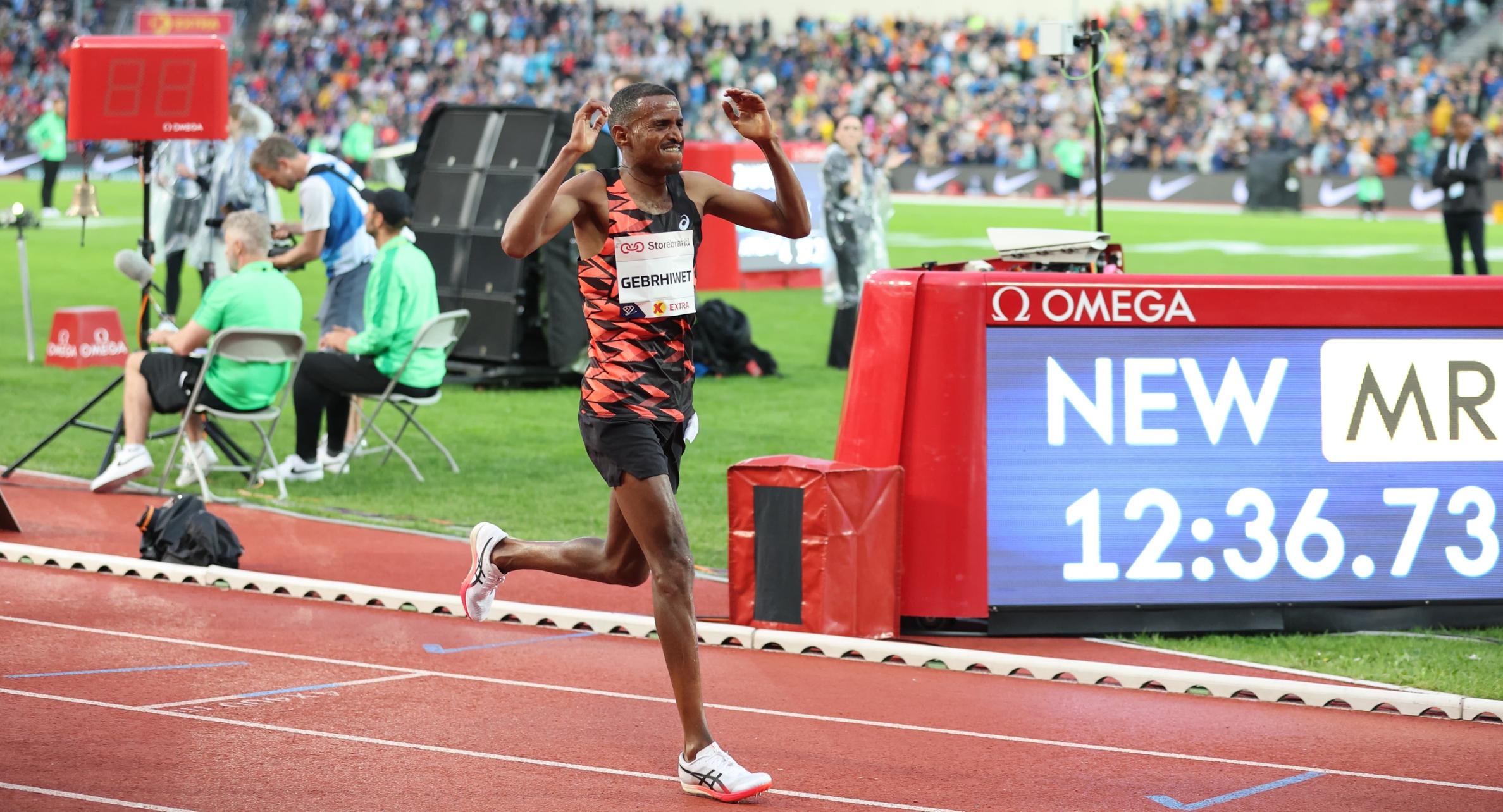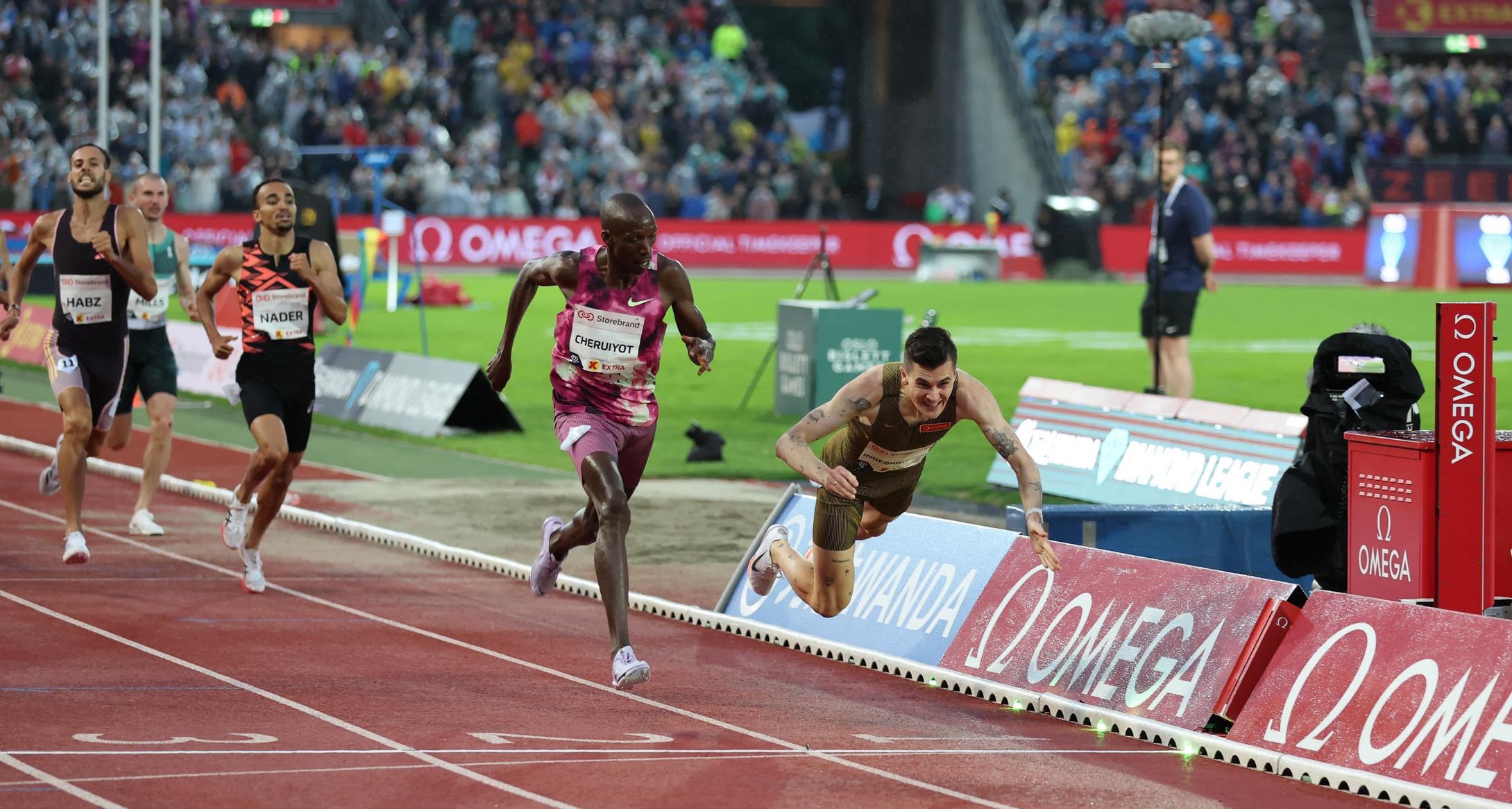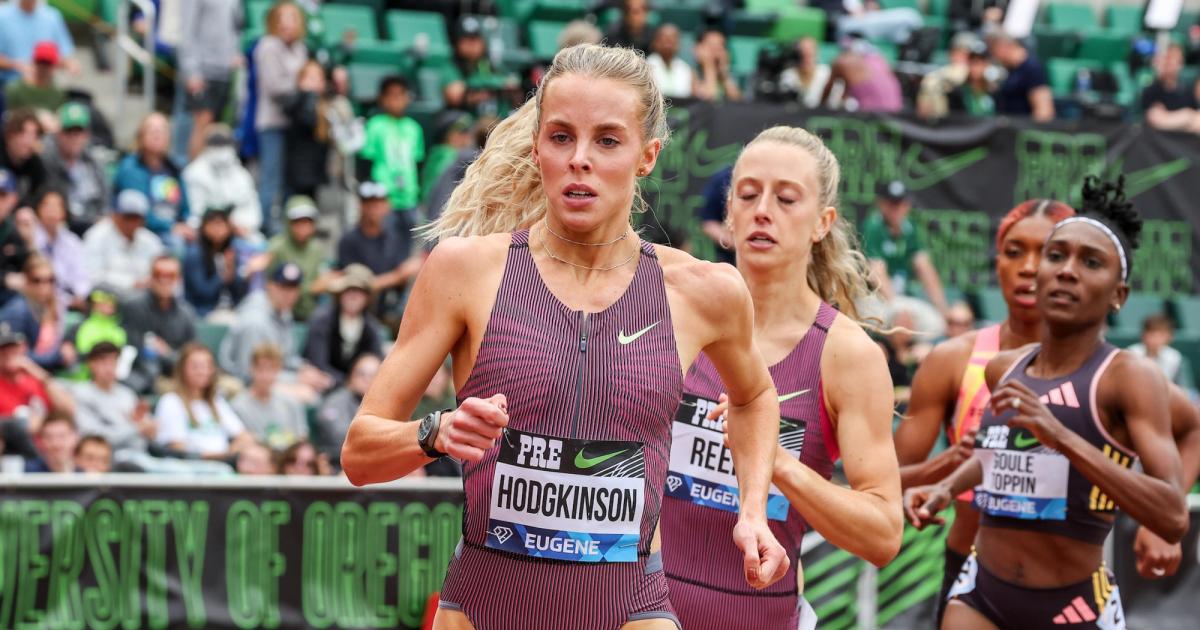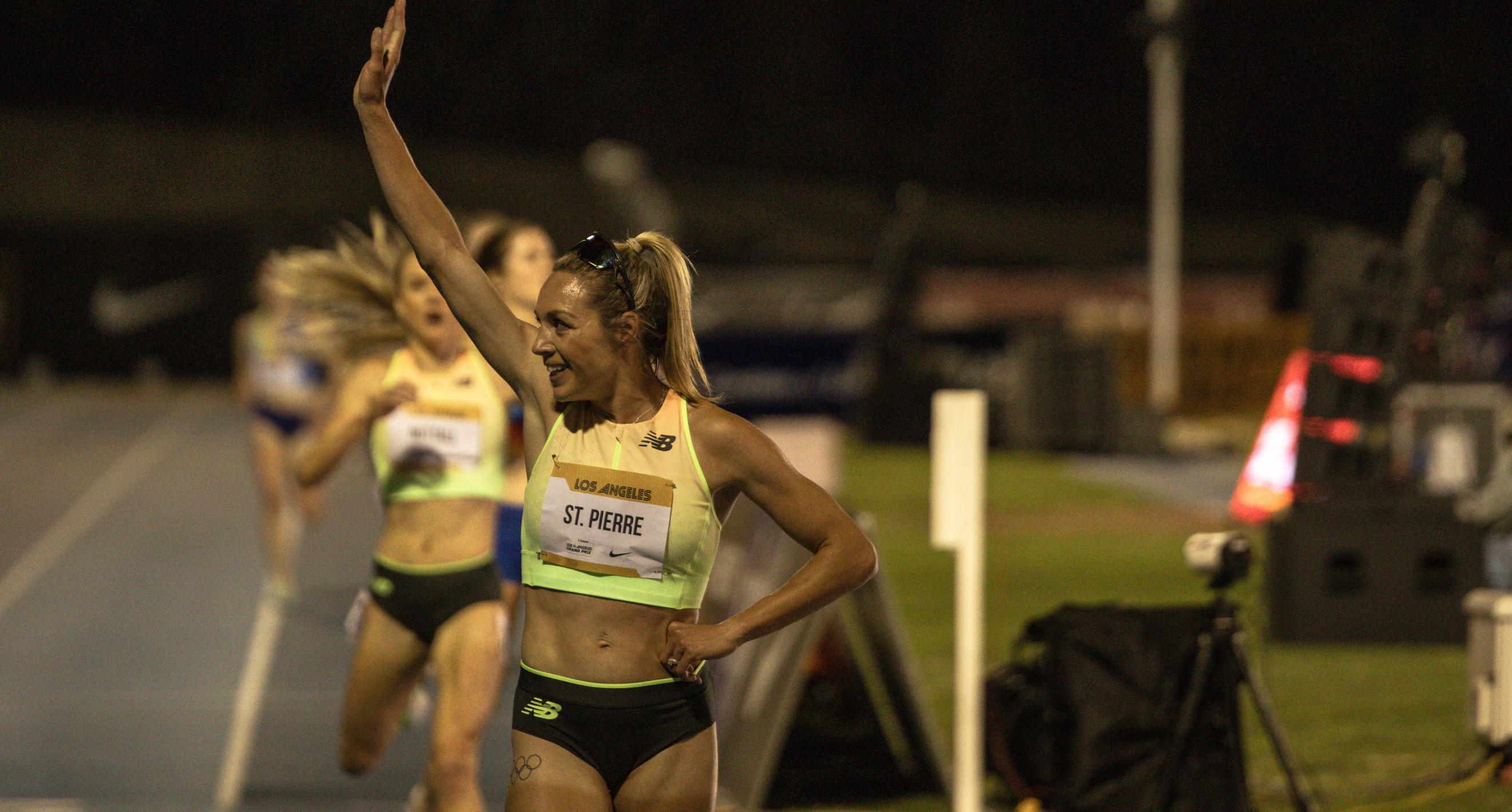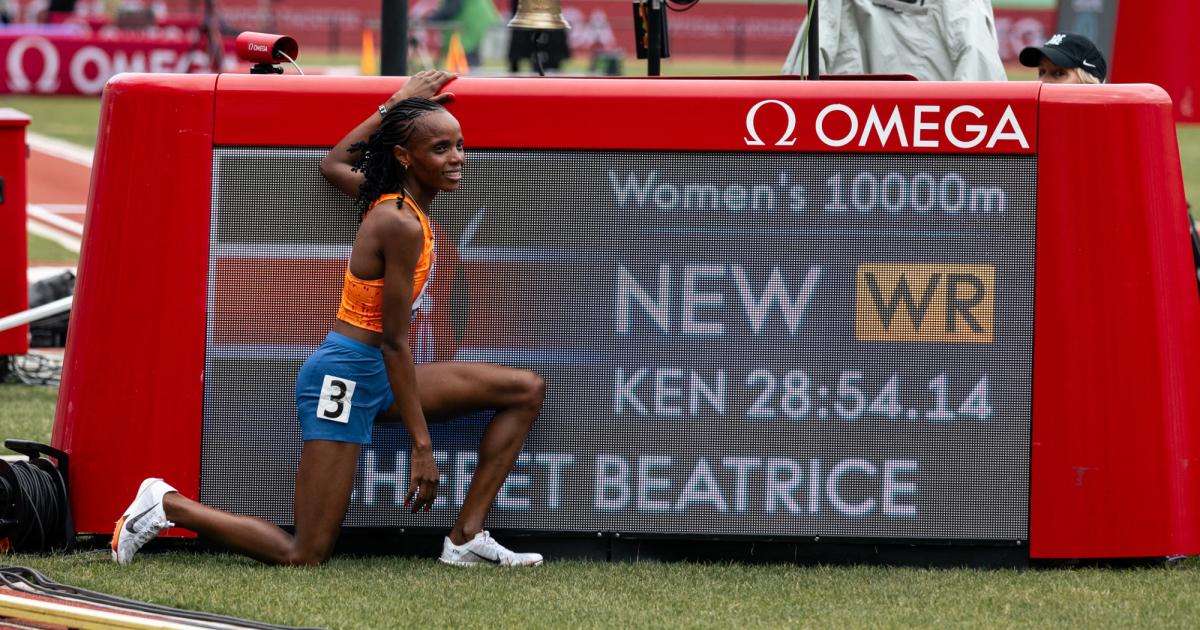By Owen Corbett
June 1, 2024
On a Thursday night in Oslo, a field of more than 20 5000m runners gave distance running fans a gift. We saw a close race down to the final lap, a near world record, and a train of personal bests and national records down the results sheet. While American fans may not have been attuned to the race (there weren’t any U.S. athletes in the field), a few of the runners went through the NCAA system and still train stateside. For further stars and stripes context, Grant Fisher’s American record (12:46.96) would have placed fourth in the race. If you are wondering how much times have changed since Fisher's record at the end of 2022 – a time that stood as the 18th fastest in history just two seasons ago – it has been bumped down to 32nd all-time after Thursday.
There were storylines all throughout a race that produced the fastest 13th, 12th, 11th, 10th, 9th, 8th, 7th, 3rd, and 2nd place finishing times in 5000m history. Below we break down every runner’s performance from the race aside from the pacers. Well, at least the ones that didn’t finish the race… more on that soon.
DNF - Mike Foppen (Netherlands)
Remarkably, Foppen was the only casualty of the quick pace in terms of non-finishers. Part of that is likely due to the ideal distance running conditions (it was overcast and in the low 60s when the race kicked off just before 9 p.m. in Oslo), but it is also undoubtedly due to the incredible strength of the field.
Foppen came in with a PB of 13:05.66 from last July, and a SB of 13:08.60 run at BU in January, both of which are in the Olympic qualifying window. Those results are a big reason why he is in line for a trip to Paris despite missing out on the 13:05 standard once again. Of the currently nine spots that are available via world ranking, Foppen sits second behind only Jakob Ingebrigtsen. The Dutch national record holder also recorded a DNF at the Tokyo Olympics.
19th, 13:44.52 - Awet Nftalem Kibrab (Norway)
The Eritrean-born Kibrab has been representing Norway since last June. He made his national debut for the country at the inaugural World Road Running Championships last year when he finished eighth in the 5k (13:28). If this is your introduction to Kibrab and you find yourself a fan, then you’re in luck. For just under $23 you can be the proud owner of an “I Think My Soulmate Is Awet Kibrab Nftalem” t-shirt. The internet is an amazing place.
Kibrab looks like he is about 30m ahead of Gebrhiwet as the latter is kicking to the finish line. The fact that no one got lapped in a 12:36 race shows how incredibly talented the field was top to bottom.
18th, 13:30.45 - Brian Fay (Ireland)
Despite a disappointing performance, Fay came into the race already holding the Olympic standard thanks to an impressive 13:01.40 Irish record in Heusden last summer. The former PAC-12 champ out of Washington has had a rocky start to the year, failing to crack the top 10 in any of the three Diamond League races he has entered.
Just 1400m into the race, while there is a front pack of 15 runners behind lead pacer Callum Davies, you can see that Fay has already lost contact. He is, however, right on the shoulder of secondary pacer Jude Thomas, while the four runners trailing him are already falling off that slower pace.
17th, 13:25.70 - Per Svela (Norway)
Svela, a two-time Norwegian indoor champion over 3000m, was making his return to the Bislett Games for the first time in five years. The 32-year-old is the fastest Norwegian over 5000m this year with a 13:19.87 PB back in April. Svela has a Bislett Games win on his record in the 3000m back in 2017.
16th, 13:23.66 - Kvan Ferdinand Edman (Norway)
The highest Norwegian finisher in the race set a 16 second PB in his first 5000m since 2021. Edman represented Norway on the national stage two years ago contesting the 1500m at the 2022 World Championships. He competed collegiately for UCLA from 2013 to 2016 and finished 14th at Cross Country Nationals his senior year.
15th, 13:18.67 - Stanley Mburu (Kenya)
Mburu, the 2022 World silver medalist in the 10,000m, was one of the most intriguing entrants in the race. Just five days earlier, he had run the Kenyan 10,000m Trials at the Prefontaine Classic and finished seventh in 27:07.37. Missing out on the chance to represent his country in his main event in Paris, Mburu decided to give half the distance a go.
Mburu, running only his second 5000m race over the past two seasons, may have underestimated how much the 10,000m effort and subsequent travel took out of him as he goes right to the front at the beginning of the race. Through 800m, Mburu trails only Cheptegei and Kejelcha among non-pacers, elite company for the man with a 13:05.21 PB (from 2019!). Unfortunately Mburu quickly faded and will likely be watching the Olympics from home this summer.
14th, 13:08.80 - Telahun Haile Bekele (Ethiopia)
The fact that Bekele never played a factor in this race is strange given his 12:42.70 PB run last year in Monaco. It was the 25-year-old’s outdoor opener though, and his first race since February. That long layoff, combined with the fact that he was a scratch from World Indoors, likely means he is coming back from an injury.
Despite the fact that Bekele – who finished third in this race last year and won it in 2022 – ran 12:49, 12:46, and 12:42, all within the span of five weeks last summer, he was only the fourth fastest Ethiopian in the world and missed out on a World championships berth. After this race, the third fastest Ethiopian time of 2024 is already 12:49.65, so Bekele will have to get in shape rather quickly if he wants a chance to be selected for Paris.
Interestingly, Bekele’s most successful global finish came back in 2019 (fourth place at Worlds), before he became a sub-12:50 man.
13th, 12:56.67 - Adriaan Wildschutt (South Africa)
We have arrived at our first sub-13:00, and our first national record in the race. And we’ve got 12 more athletes to cover, still! The race on Thursday tied a record with 13 men running under 13:00. That record was set last year in Florence, where the 13th finisher ran over two seconds slower in 12:59.03, giving this race the undisputed title of deepest 5000m in history.
This winter Wildschutt, who trains with NAZ Elite in Flagstaff, Arizona, became the first South African in history to run under 13:00 with a 12:56.76 clocking indoors at BU. Then in March, the former Florida State Seminole secured an Olympic spot by running 26:55.54 for sixth place at the TEN in one of the deepest 10,000m races of all time. On Thursday, Wildschutt just beat his indoor time while shaving nearly six seconds off his outdoor national record.
After running the 5000m at Worlds in 2022, and the 10,000m in 2023, Wildschutt is in position to attempt the double at his first Olympics in Paris.
12th, 12:55.78 - Samuel Tefera (Ethiopia)
Just before the beginning of the race, the NBC broadcast showed three “Stars To Watch” in the race, and Tefera is peculiarly paired with Cheptegei and Kiplimo, despite his 12:58.44 PB being the 11th fastest in the field. The likely reason for his inclusion is his two World Indoor titles over 1500m. But a more fitting choice would be Kejelcha, who holds the same titles over a more fitting distance, 3000m, and has a 5000m PB more than 16 seconds faster.
In his defense, Tefera does a good job sticking with the pace, and is one of nine men still in contention after 3000m (7:41.05). Just a lap later however, Kejelcha inserts a surge and the men go from running laps in the mid-61s to the low-60s. Tefera is one of four men that can not hold on.
Ironically Tefera’s old PB comes from a 12th place finish in the previously mentioned 13-under-13:00 race in Florence last year. To show how much this race has changed in the past two years, Tefera was the runner-up at the Bislett Games in 2022 running 13:04.35 in just his second 5000m ever. Tefera also ran 13:02.09 for seventh here last year.
11th, 12:54.97 - Jimmy Gressier (France)
Gressier has been on a record-setting tear over the past two seasons. In February of 2023, the Frenchman ran 13:12 on the roads of Monaco, setting a European record for the road 5k. In July, he was back in Monaco, this time setting a French record over the same distance on the track by cutting 12 seconds off his PB to run 12:56.09.
He repeated the pattern in 2024 when he broke the European road 10k record on home soil in Lille, France, in March, before lowering his own 5000m national record on Thursday.
In addition, Gressier ran the fifth fastest half marathon in European history (59:46) last October while finishing fifth at the distance at the World Road Running Championships. It was just his second career half, and he was the only non-African to finish in the top 10.
10th, 12:54.59 - Oscar Chelimo (Uganda)
Chelimo was one of the few top-level men in this race still looking for the Olympic standard, as his 13:00.42 PB was from 2022. The Ugandan was thrown into the fire for his first track race of 2024 and he responded excellently. He holds off a charge from Gressier down the finishing straight to nab a spot in the top 10.
Chelimo, the younger brother of Jacob Kiplimo, often gets lost in the shadows of world record holders like his brother and Cheptegei, but he has an immense amount of talent himself. He recorded a DNF in the World final last year in Budapest, but won the bronze medal in Eugene in 2022 and is still only 22 years old.
As the third Ugandan with the standard under his belt, Chelimo will likely be representing his country on the global stage for the fourth straight summer in Paris
9th, 12:51.94 - Joshua Cheptegei (Uganda)
When the world record holder comes in ninth place in a race, the default interpretation is that the athlete had a bad race. While the outcome is surely not what Cheptegei wanted, that is far from what happened here.
After Cheptegei said he made some tactical mistakes in his season debut in LA (which still led to a 12:52.38 clocking and a third place finish), the reigning Olympic champ made sure to put himself right at the front of the race in Oslo. From 200m to 2800m in the race, Cheptegei sits right on the shoulder of Kejelcha, who trailed only the pacers. At that point though he begins to fall off the hot pace (although the 3000m split for his WR was nearly six seconds faster than where they went through on Thursday).
He is one of the four men to go with Kejelcha’s final mile surge, but just two laps later he is well behind the top three runners. The most concerning part of the race for Cheptegei is the final 600m, in which he falls from fourth to ninth. While the three-time World champion over 10,000m will be one of the favorites over his signature distance in Paris, he may not have the speed any longer to defend his 5000m gold at 27 years old.
To put into perspective the talent that is present in men’s distance running today, Cheptegei, who is considered by many as the greatest distance runner of this generation, has only won one race in ten tries over the last two seasons (his World 10,000m gold in Budapest), and hasn’t won a DIamond League race since August 2021 (2 mile at Pre in 2021).
8th, 12:50.94 - Andreas Almgren (Sweden)
The top European finisher in the race, Almgren’s nearly nine second PB makes him the second fastest European-born man ever over 5000m behind only Jakob Ingebrigtsen (12:48.45). Almgren has been on a tear this year, and will be dangerous in Paris over both the 10,000m and 5000m if he chooses to contest both.
The Swede’s big year started in February with his half marathon debut, where he finished second (59:23) to former world record holder Kibiwott Kandie in Barcelona, a performance that stands as the second fastest half marathon ever by a European. Almgren then knocked out the 10,000m Olympic standard in his debut at the distance in March, finishing third behind Grant Fisher and Nico Young at the TEN. Almgren became the first man in history to have run sub-27:00 for 10,000m and under 1:50 for 800m (he has a 1:45.59 PB, talk about range!) Young has since joined him in that group.
Almgren then ran under 13:00 for the first time over 5000m, breaking the Swedish record on home soil, just two weeks before his race in Oslo where he knocked nearly 10 seconds off his own mark.
7th, 12:50.90 - Dominic Lobalu (Switzerland)
Dominic Lobalu will likely get to fulfill his Olympic dream. The Sudanese-born runner escaped from a war torn country as a child, and was recognized in Kenya for his talent. Lobalu competed at a few global events as a member of the Athlete Refugee Team, but fled the team in 2019 to remain in Switzerland, ending his chances of competing in the Tokyo Games.
He burst onto the scene in 2022 with a Diamond League victory in Stockholm, beating Kiplimo over 3000m. Lobalu finally became eligible to represent Switzerland on May 10th, but still needed the standard to secure a spot for Paris. His performance in Oslo more than took care of that, and set a Swiss national record in the process.
Lobalu’s PB before Thursday was 12:52.15 from a 2022 race, but since he wasn’t yet representing Switzerland, the nearly 40-year-old national record of 13:07.54 still stood as the mark to beat.
6th, 12:50.58 - Luis Grijalva (Guatemala)
Grijalva has finished fourth in each of the last two World finals over 5000m, and he was mixing it up with the world’s best once again on Thursday. The result was very similar to last year when he finished fifth in this race (12:56.63), but everything was just a notch faster.
In 2023, Grijalva was with the leaders through 3000m (7:47.20), but by the time the broadcast cuts back to the race at 3700m, he is well off the pack. This time around, the former NAU Lumberjack is in it again through 3000m, albeit six seconds faster, but when Kejelcha takes off at 3400m, Luis is one of the men that can’t hold on.
He took solace in the fact however that Diamond League racing and championship racing were almost “two different sports.” The 5000m final in Paris obviously won’t be a 12:36 race, and Grijalva told CITIUS MAG after the race, “As long as I’m in 12:50 shape, I’ll be there with a lap to go.”
The race was Grijalva’s first big effort coming off of a winter in which he says he suffered the first real injury of his career, a sacral stress reaction back in November. The Flagstaff-based Guatemalan ran under 13:00 three times last summer, including his previous national record of 12:52.97 for third in the aforementioned Florence race. If he is already beating those times off an abbreviated buildup, Grijalva will be dangerous for the rest of the summer.
5th, 12:49.65 - Addisu Yihune (Ethiopia)
After Callum Davies steps off around 1900m, Yihune, the second pacer, takes control of the race. The 21-year-old Ethiopian is passed by his countryman Kejelcha with a mile to go, but he stays in the race and is rewarded with a massive personal best. Yihune already took care of the Olympic standard with a personal best (13:01.44) in his season opener in Xiamen, but his performance on Thursday drastically increased his chances of being selected for Paris.
As the third Ethiopian in the race, Yihune also stands as the third fastest Ethiopian of 2024 over 5000m (although he is the fifth fastest in the qualifying window behind Berihu Aregawi and Bekele). Most remarkably, when Yihune finished it looked like he thought he had another lap, meaning he may have been able to go even faster (he crosses the finish line at the 13:10 mark of the video).
Until Thursday, Yihune may be best known to American fans as the runner that Conner Mantz accused of pushing him into a fence at the finish of last year’s Beach to Beacon 10k in Maine. But Yihune is a World U20 champ over 5000m from 2022, and now may be closer to his first opportunity to represent his country on the senior level.
4th, 12:48.10 - Thierry Ndikumwenayo (Spain)
Another athlete who has now made big statements in this race two years in a row, Ndikumwenayo took a big step forward after his sixth place finish last year (12:58.60). He ran under 13:00 in Diamond League races three times last year, but his average finish was ninth, and he failed to make the final in Budapest.
The fourth place finish is huge for Ndikumwenayo, whose time is the second fastest in Spanish history behind the currently-suspended Mo Katir. Only running for Spain since last April, the Burundian-born runner is looking toward his first Olympics this summer. His only global competition on the track before 2023 was a DNF in the 10,000m at Worlds in 2019
3rd, 12:40.96 - Jacob Kiplimo (Uganda)
Last year in this race, Kiplimo and Kejelcha took it down to the wire in one of the fastest and closest 5000m races in history. For the majority of the race this year, it looked like we might be in for a rematch.
In 2023, Kiplimo led the race from the moment the pacer (Callum Davies once again) stepped off, until Kejelcha made a move with 800m to go. The two runners crossed the line with identical times, and minutes later Kejelcha was given the win off a photo finish.
This year Kiplimo decided to let Kejelcha do the leading. With 1000m to go Kiplimo moves up into third but struggles to stay in contact with the top two. Kiplimo never sniffs the lead and isn’t in position to respond to Gebrhiwet’s move with a lap to go, but nonetheless he shaves nearly a second off his personal best from last year’s race. Despite a new PB, Kiplimo actually end sup moving down the all-time list to eighth.
Remarkably, Kiplimo has not won a track race since he won double gold at the 2022 Commonwealth Games (he is undefeated on the roads and the grass since then however), and he has not won a Diamond League race… shockingly ever.
After the two-time World Cross Country champion missed Budapest last year with an injury, he is in position to double in Paris, looking to improve on his 10,000m bronze and fifth place finish in the 5000m from Tokyo.
2nd, 12:38.95 - Yomif Kejelcha (Ethiopia)
After being the one to make the big move last year and win in a photo finish, Kejelcha did not have it in him to match the incredible run by Hagos Gebrhiwet. In his first race on the track this year, the tall Ethiopian set a personal best and moved up to fourth on the all-time list, passing the legendary Haile Gebrselassie (12:39.36).
Kejelcha stays right behind the pacers until he passes Yihune with 3400m to go following a 60.3 lap, and then picks up the pace. Kejelcha doesn’t relinquish his lead until the final 400m, but he never has a chance once he gets passed.
Kejelcha’s push toward the finish played a big role in the fast time that Gebrhiwet ended up running. The last 2000m of the race were covered in 4:55.68, faster than in Cheptegei’s WR (5:00.22) and in Kenenisa Bekele’s former WR (5:00.03), but just slower than in last year’s race (4:54.53).
Outside of his fifth place finish in the 5000m at Worlds last year, Kejelcha has finished either first or second in each and every one of his races the past two years, but he’s starting to become best known for his losses. Kejelcha’s second place finishes over the past few years have included losses to: Jakob Ingebrigtsen by .01 seconds in the 3000m at last year’s Diamond League Final, Mo Katir by .03 seconds in last year’s Florence 5000m, Gebrhiwet by three seconds for the road 5k World title, and Kibiwott Kandie by one second in the deepest half marathon of all-time in Valencia last year.
Kejelcha has regular season head-to-head wins against all of the best distance runners in the world, but it has only translated to one outdoor global track medal, a 10,000m silver back in 2019.
The 26-year-old has represented Ethiopia at every outdoor global track championship since 2015 other than the Rio Olympics, and looks to be in position to do so again in Paris unless two more Ethiopians top his insane time.
1st, 12:36.73 - Hagos Gebrhiwet (Ethiopia)
Finally, we come to the man of the hour. Hagos Gebrhiwet is not the most household name among track and field fans, but he has been one of the most consistent runners of the past decade plus. Speaking to his underrated status, in a race where he ran the second fastest 5000m time in history, he doesn’t get mentioned on the NBC broadcast until 10:24 into the race, when there is less than a kilometer to go.
Gebrhiwet runs a patient race over the first half, then at 2800m, as a gap starts to form behind Yihune and Kejelcha, he makes a strong move up to third place. He then stalks Kejelcha until unleashing a burst of speed to drop his last competitor with just 400m to go. When he makes his move, it is decisive, Gebrhiwet opens up a lead of more than 10m on just the first curve of the final lap.
The scenario played out very similarly to Beatrice Chebet’s 10,000m world record last weekend as she effortlessly followed Gudaf Tsegay before surging toward the finish. The difference in this case is that Kejelcha, unlike Tsegay, didn’t look like he was struggling in the lead, making Gebrhiwet’s strong finish even more impressive.
How strong of a finish was it? Gebrhiwet covered his last lap in 54.99 – faster than Jakob Ingebrigtsen closed his sub-3:30 1500m (55.06) – and he ran his last 800m in 1:54.61.
Gebrhiwet took down Kenenisa Bekele’s Ethiopian record one day before its 20th birthday, breaking the mark of arguably the best distance runner in history that stood as a WR for over 16 years.
The 30-year-old Gebrhiwet first broke 13:00 in 2012 (setting a world junior record of 12:47.53 that has only been topped by Selemon Barega since), and has done so in eight of the past 13 years. The newly signed ASICS runner has always posted fast times – this was the sixth sub-12:50 clocking of his career, tied with Bekele for the most ever – but he only got his first global gold last year winning the 5k at the World Road Running Championships.
Gebrhiwet, who is undefeated on the year, has a silver medal and two bronzes on the track, but all of those were between 2013-2016. Now the fastest man in the world this year, he’ll have a shot to finally earn gold on the biggest stage this summer in Paris
Gebrhiwet is by far the oldest man to ever run under 12:40. Kejelcha is the second oldest at 26(!), but Gebrhiwet was nearly five years older on the day of his run than anyone else who had ever broken the barrier before Thursday.
Gebrhiwet has had an up and down career. He formerly ran for Adidas and seemed to be unsponsored last year but the braces-wearing Ethiopian will now have his name etched in history right behind Cheptegei, and has a chance to cement his legacy with an Olympic gold this summer. While Jakob Ingebrigtsen has won both of the last two global 5000m titles, the races have each been won around 13:10. Ingebrigtsen will likely be the favorite in Paris, but after the 1500m, would he have fitness to hold with the Ethiopians if they work together to make it a sub 12:50 race? It’s a tactic they have curiously not tried against him in the past.
If you watched this race on Thursday afternoon and were looking for a 4,000+ word recap on it, you’re welcome. Either way, this serves as historical context for one of the fastest, deepest 5000m races we have ever seen, until it is inevitably topped in a few months by another loaded field, because that is the state of Diamond League 5000m running these days.

Owen Corbett
Huge sports fan turned massive track nerd. Statistics major looking to work in sports research. University of Connecticut club runner (faster than Chris Chavez but slower than Kyle Merber).
